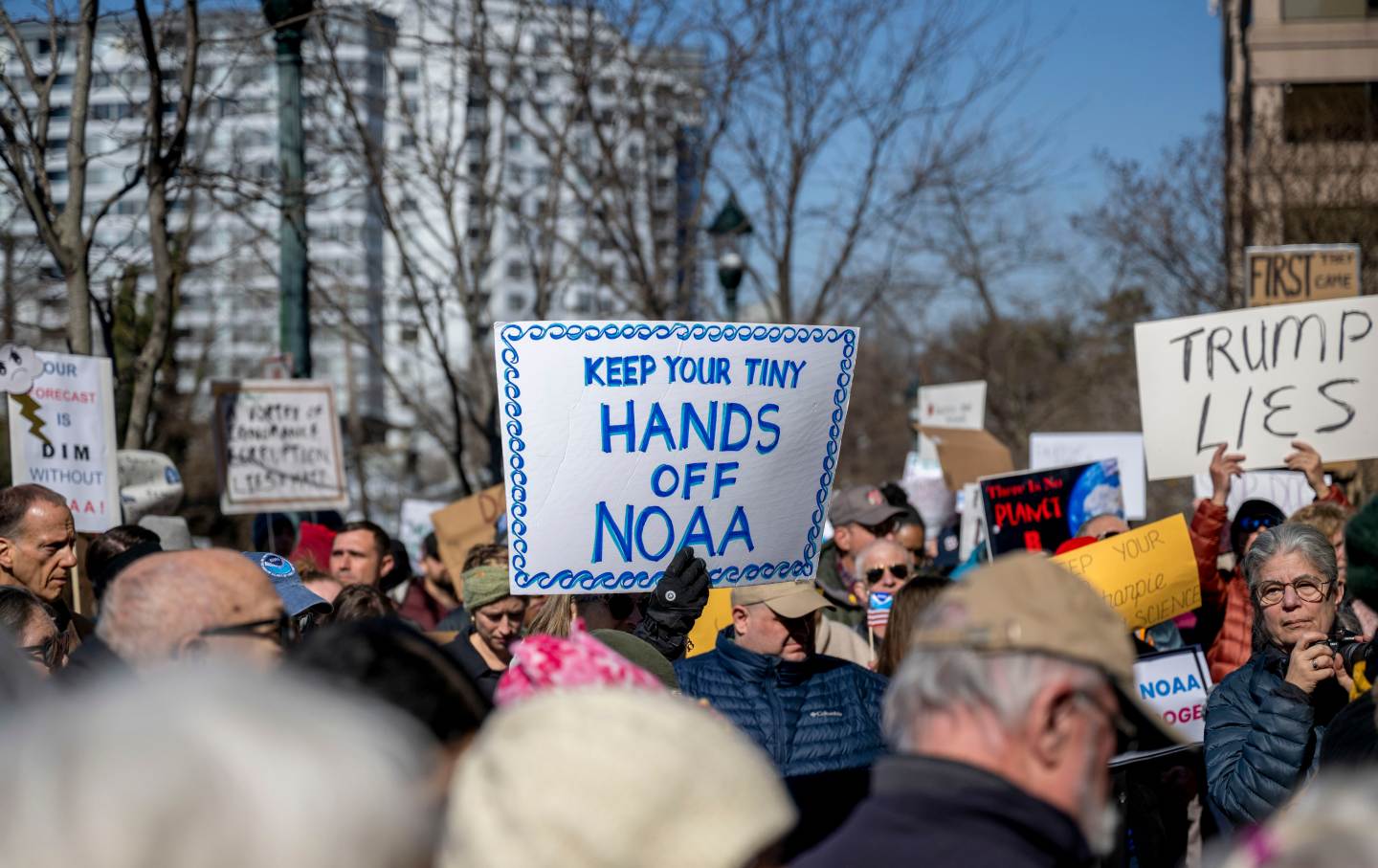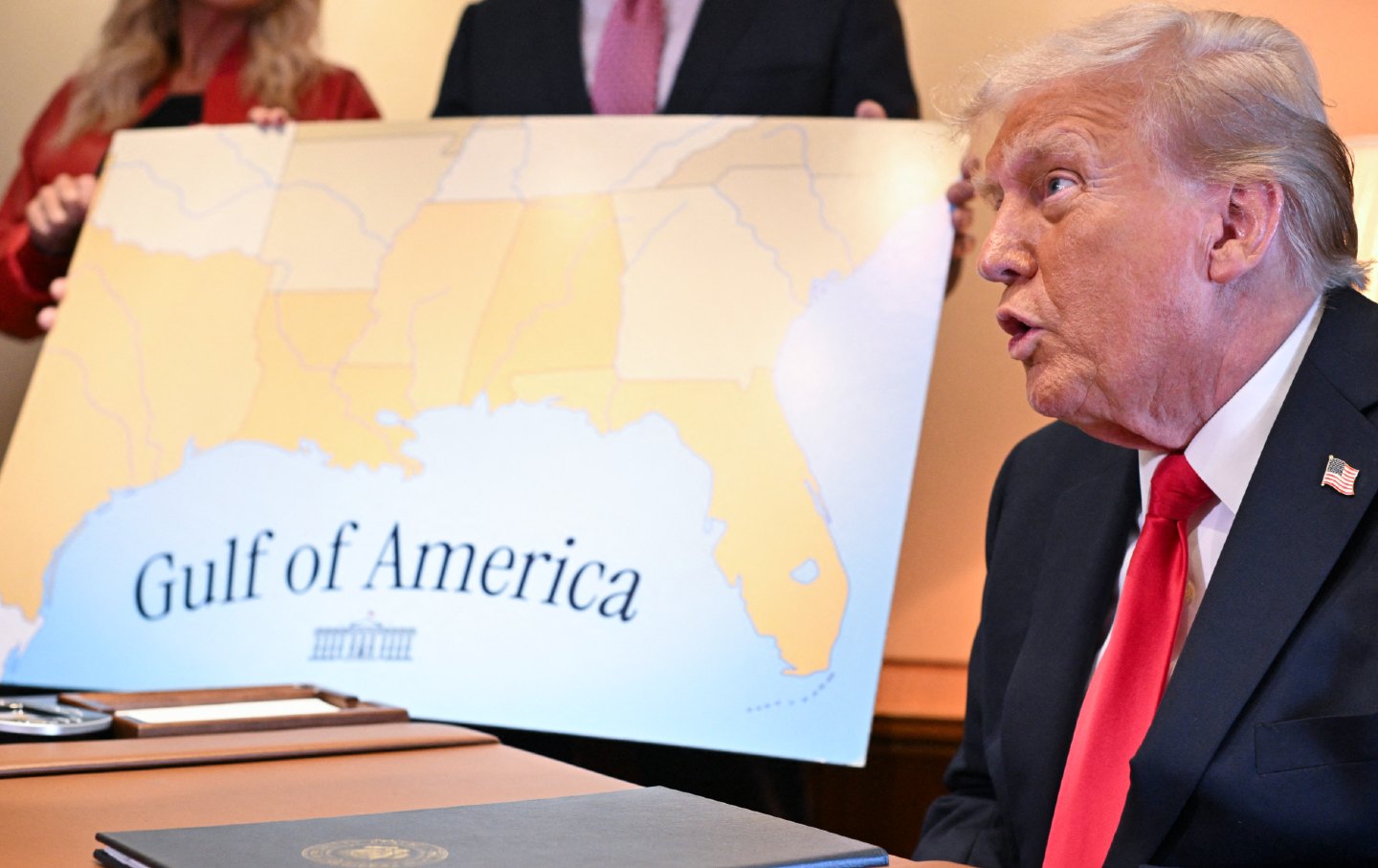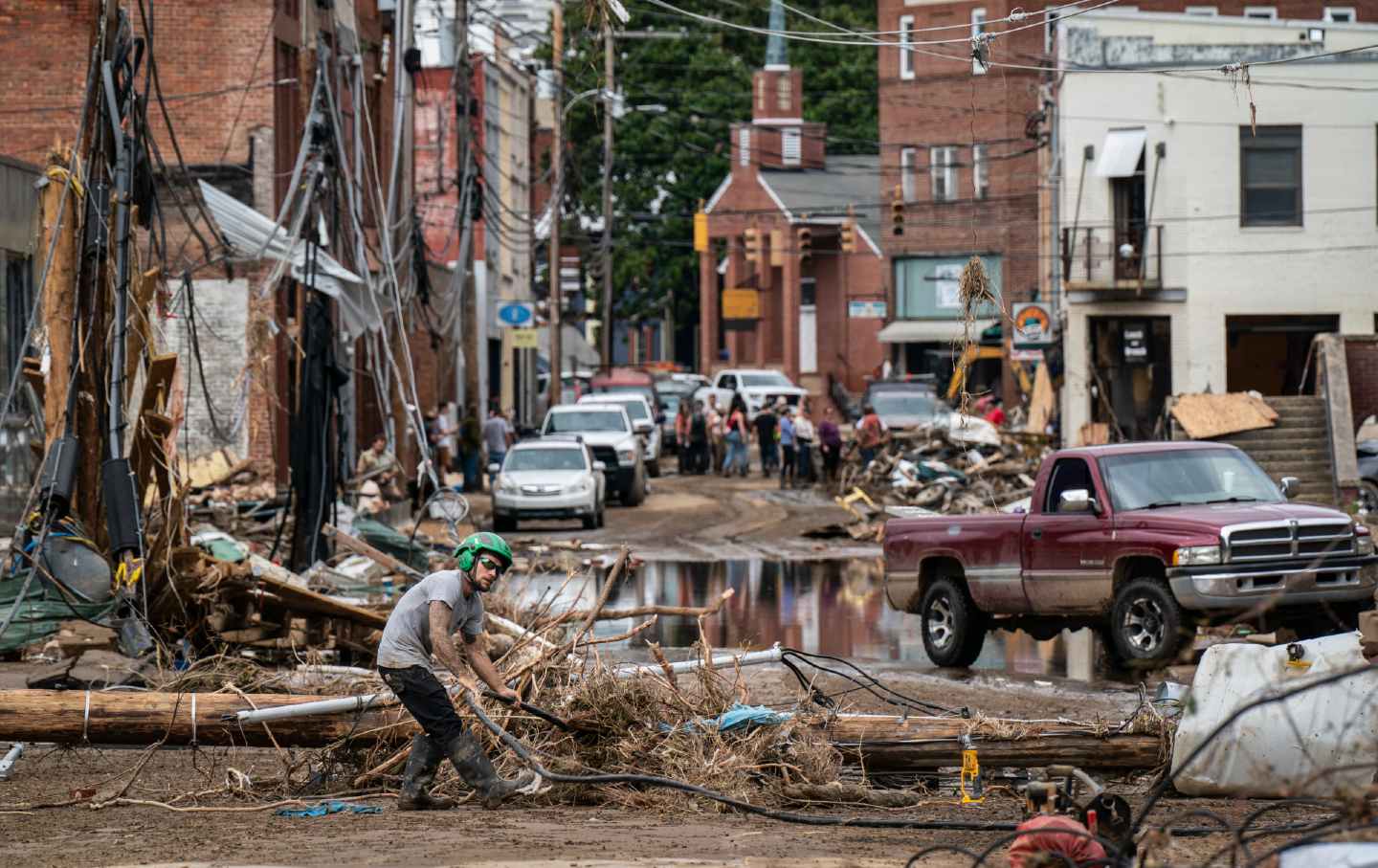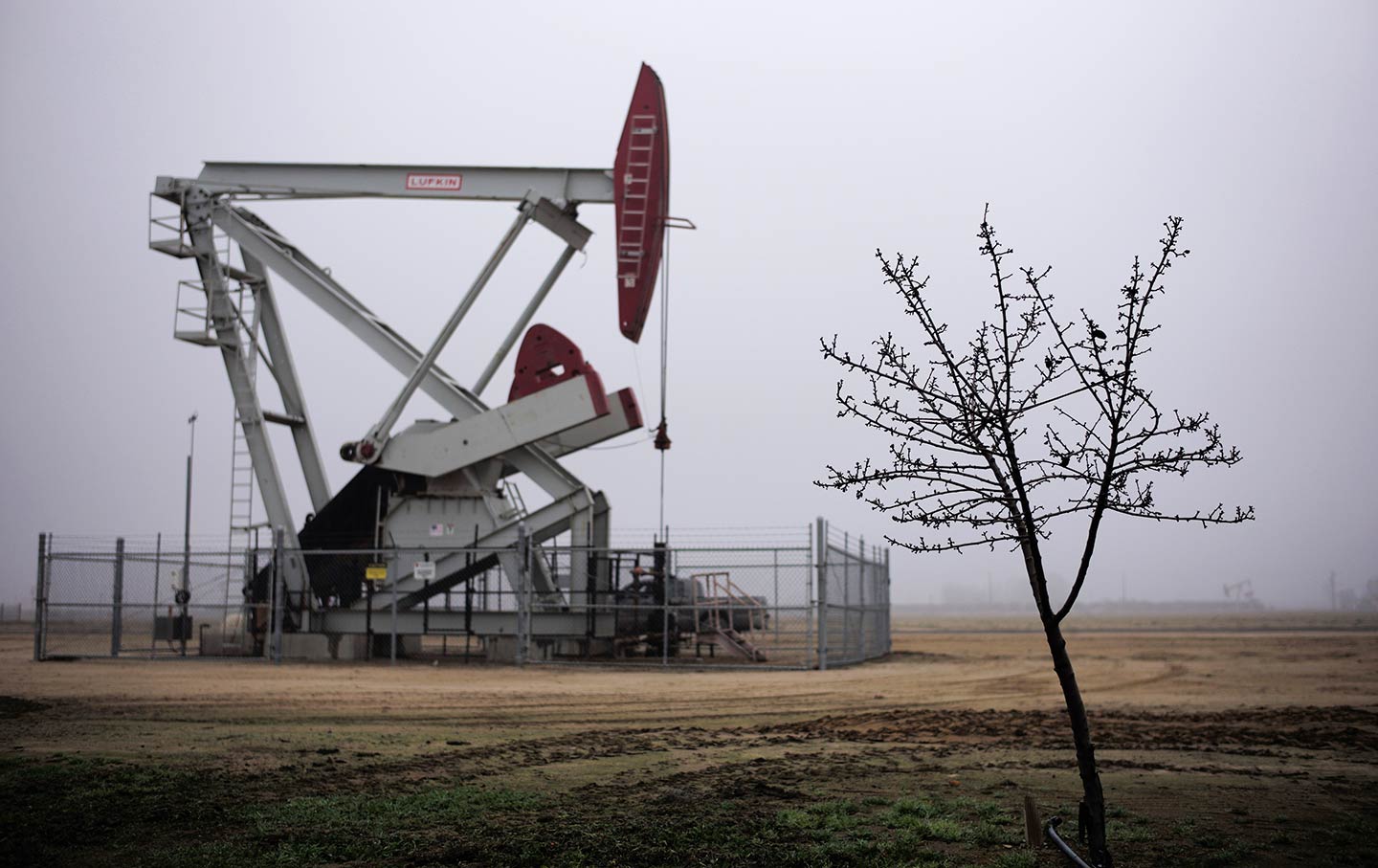Kamala Harris Doesn’t Need to Backtrack on Fracking
In 2019, Harris said that there was “no question” that she would pursue a federal ban on fracking. In 2024, she’s taken a different—and unnecessary—stance.

Democratic presidential nominee Vice President Kamala Harris during the debate at the National Constitution Center on September 10, 2024.
(Win McNamee / Getty)
On September 10, Kamala Harris faced off against Donald Trump for the first time. Debating from Philadelphia, ABC’s Linsey Davis and David Muir zeroed in on the candidates’ views on immigration, abortion, inflation—as well as fracking, a hot-button issue in Pennsylvania. Trump claimed that “fracking in Pennsylvania will end on day one” if Harris wins the election. “She has a plan to not allow fracking in Pennsylvania or anywhere else.”
Hydraulic fracking, a method of extracting natural gas or oil from “tight” rocks, such as shale, involves blasting large quantities of water, chemicals and sand at high pressures in order to crack the rock and access fossil fuels. Campaigning for president in 2019 at a CNN town hall, Harris said that there was “no question” that she would pursue a federal ban on fracking.
But by 2020, she’d backtracked. As vice president, Harris even voted to increase leases for fracking as part of the Inflation Reduction Act. On the debate stage, Harris emphasized that she would continue this record as president: “I made that very clear in 2020. I will not ban fracking.”
In recent elections, climate change has become even more politicized, fueled by a perception that phasing out fossil fuel energy will derail the American economy and destroy hundreds of thousands of jobs. In 2024, fracking is at the center of this tension, along with the seemingly crucial economic role it plays in the must-win swing state of Pennsylvania, the second=largest producer of natural gas in the country.
Most of Pennsylvania’s fracking takes place on private and state lands—not federal. “Fracking is almost entirely left to the states, even as far as the way that it’s regulated,” Colin Jerolmack, professor of environmental studies and sociology at New York University, said. “It’s far more consequential who the governor of Pennsylvania is than who the president is.”
Pennsylvania’s Democratic Governor Josh Shapiro has collaborated with the natural gas industry, repeatedly reversing his strong environmental record as attorney general. Alongside the state’s Democratic senators, John Fetterman and Bob Casey Jr., Shapiro opposed the Biden administration’s pause on new approvals of liquified natural gas terminals, citing potential job loss.
Mainstream media and political strategists alike have made it seem like even toying with the idea of a fracking phaseout is political suicide. But in actuality, fracking is far from an economic or political powerhouse.
Polls have shown that many Pennsylvanians oppose fracking, or are—at best—split on the issue. A 2021 poll from the Ohio River Valley Institute, a sustainability think tank, found that only 31 percent of Pennsylvania voters support fracking. Meanwhile, 55 percent believe that fracking should end as soon as possible or be phased out over time. A 2024 poll from the Global Strategy Group also found that 78 percent of Pennsylvanians are in support of significantly increasing use of clean energy.
“I think the polls show that enough people support a ban or a slowdown, at least, of fracking, that you could stick to at least wanting to tightly regulate, if not ban, the industry, and not actually sacrifice that many votes, but they’re not willing to,” Jerolmack said.
According to Jerolmack, much of the ambivalence from voters comes from fracking’s clear health and environmental harms. These concerns compelled climate activist Jessie Bluedorn to ask Harris a question about fracking at the CNN town hall in 2019, as she saw the industry seek to set up shop in communities around her grandparents’ farm. “Fracking, specifically, was one of my first entry points into the larger climate and environmental movement, because I saw it impacting my extended family directly in western Pennsylvania,” Bluedorn said.
In 2022, the Yale School of Public Health found that children living near fracking sites were two to three times more likely to be diagnosed with leukemia. Researchers at the University of Pittsburgh found that these children also had a higher risk of developing lymphoma and asthma. Southwestern Pennsylvania, where much fracking activity takes place, is known as a cancer hot spot.
But Jerolmack also emphasizes that fracking’s economic effects are a cause for concern: The economic prosperity the industry promised has simply not been delivered.
“The middle of Pennsylvania, where most fracking is occurring, historically a lot of coal mining happened there,” Jerolmack said. “Those were the glory days. Coal provided more jobs than have been there since. And so there’s always been this nostalgia and this hope that somehow we can bring that back. In the past 50 years—especially since manufacturing declined—the population has declined and the economy has declined.” It was under this backdrop that the fracking boom of the mid-2000s arose, fueled by technological innovations that finally allowed industry to access the Marcellus Shale Formation—the largest deposit of methane gas in the US, whose largest portion lies in Pennsylvania.
Fracking is why the United States now produces more natural gas and oil than ever before. Big Oil would like to say that this boom in production has translated into hundreds of thousands of jobs, positioning fracking as “fundamental to the health and strength of Pennsylvania’s economy.” A 2023 economic impact analysis commissioned by the Marcellus Shale Coalition, which helps produce natural gas from the Appalachian Basin, found that natural gas supports around 123,000 jobs across Pennsylvania, and in 2022, brought in $41 billion to the state’s economy.
However, according to environmental advocacy group PennFuture, these numbers are highly inflated. Even the Bureau of Labor Statistics disputes the industry’s claims, finding in 2020 that fracking actually employed about 24,000 people and contributed $583 million to Pennsylvania’s annual economy. In 2023, the US Energy Information Administration estimated that the industry’s employment levels had fallen to about 20,000 direct and indirect jobs—about 0.3 percent of the state’s total jobs.
“Economically, it’s a fairly tiny part of Pennsylvania’s economy,” Rob Altenburg, senior director for energy and climate at PennFuture, said. So where did the oil and gas industry get a figure in the hundreds of thousands? It all comes down to how far one is willing to stretch the definition of a “fracking job.” For fossil fuel advocates, this often means any job that is even mildly supported by Pennsylvania’s natural gas industry—for example, people who work in the transportation and service industries.
“Were there some jobs created? Absolutely. Can you find people who got a well-paying job driving a truck for the industry, working on a drilling rig? Absolutely. Overall, were there more jobs created than if fracking didn’t occur? No,” Jerolmack said. In 2021, the Ohio River Valley Institute also found that though economic output of the industry was high, little of this income was invested back into local communities.
Jerolmack says that while doing research on the fracking boom in Williamsport, Pennsylvania—located in Lycoming County—he saw a temporary influx of workers to build out pipelines that compelled the town to build new hotels and open new restaurants. But the population declined after the initial boom. Jerolmack says that Williamsport is now struggling with vacancy problems.
“Fracking is really expensive,” Jerolmack said. “It often costs more to drill and sustain the well than the gas that comes out of it [is worth], but money keeps being pumped into it because petroleum companies have to answer quarterly to shareholders and part of what boosts the value of the company is to have proven reserves.”
Popular
“swipe left below to view more authors”Swipe →Even as Big Oil continues to tout fracking’s economic prowess, it has pulled out of the dying industry. Anadarko Petroleum liquidated its shale gas holdings in 2016, and three years later, Chevron announced that it would write down $11 billion of its shale gas assets.
“We have initiatives going on in the legislature and other places to subsidize both the supply and the demand side of it, which I’m sure the industry is happy with,” Alternburg said. “I don’t think the economics of that make nearly as much sense.” A 2019 PennFuture investigation revealed that Pennsylvanians spent $3.8 billion in tax dollars subsidizing the fossil fuel industry.
Currently, fracked gas is responsible for over 58 percent of Pennsylvanians’ electricity. In this sense, the state does run on fracking. But Altenburg emphasizes that this is not a good thing, “By putting all our eggs in this basket, we’re also seeing the impacts now of being over-reliant on gas. In one of the recent auctions of our grid operator, PJM, the capacity costs shot up more than 10 times, largely because gas is unreliable when we need it. In incidents like Winter Storm Elliott, most of the problem was forced outages with gas plants because they couldn’t run when we needed them.”
This year’s United States Energy & Employment Report found that 51 percent of Pennsylvania’s energy jobs are actually in clean energy, while nationally, oil and gas jobs have been on the decline even in the midst of historically high production. “For the longest time—and this is dating back to the Industrial Revolution—there has been this sense that if we want to create progress economically, we need to pollute,” Altenburg added. “What’s changed, particularly in the last few years, is we now have the ability to have vibrant economic growth without growing pollution, by cutting pollution. But that hasn’t sunk in yet.”
Support independent journalism that exposes oligarchs and profiteers
Donald Trump’s cruel and chaotic second term is just getting started. In his first month back in office, Trump and his lackey Elon Musk (or is it the other way around?) have proven that nothing is safe from sacrifice at the altar of unchecked power and riches.
Only robust independent journalism can cut through the noise and offer clear-eyed reporting and analysis based on principle and conscience. That’s what The Nation has done for 160 years and that’s what we’re doing now.
Our independent journalism doesn’t allow injustice to go unnoticed or unchallenged—nor will we abandon hope for a better world. Our writers, editors, and fact-checkers are working relentlessly to keep you informed and empowered when so much of the media fails to do so out of credulity, fear, or fealty.
The Nation has seen unprecedented times before. We draw strength and guidance from our history of principled progressive journalism in times of crisis, and we are committed to continuing this legacy today.
We’re aiming to raise $25,000 during our Spring Fundraising Campaign to ensure that we have the resources to expose the oligarchs and profiteers attempting to loot our republic. Stand for bold independent journalism and donate to support The Nation today.
Onward,
Katrina vanden Heuvel
Editorial Director and Publisher, The Nation
More from The Nation

Trump’s Deadly Assault on Weather Reporting Trump’s Deadly Assault on Weather Reporting
I’m a meteorologist, and breaking NOAA would undermine journalists’ ability to cover the story our audiences care about most.

Climate Retreat in Germany? Climate Retreat in Germany?
The public still wants action, but elections in the world’s third-biggest economy may stall progress.

The First Amendment vs. the Wannabe King The First Amendment vs. the Wannabe King
What are the climate implications of Donald Trump punishing the Associated Press?

How Journalists Can Stand Up to Trump’s Bluster How Journalists Can Stand Up to Trump’s Bluster
Newsroom layoffs make it harder, but reporters must keep telling the truth about climate change.

The People in Charge Won’t Save Us From Climate Catastrophe. We’ll Need to Do It Ourselves. The People in Charge Won’t Save Us From Climate Catastrophe. We’ll Need to Do It Ourselves.
Grassroots efforts in places like North Carolina show what we can—and increasingly must—do in a world plagued by climate disasters.

Trump Is Hitting the Gas on Our Path to Planetary Destruction Trump Is Hitting the Gas on Our Path to Planetary Destruction
The planet’s decline is already deeply underway. Trump’s clearly about to lend it a remarkably helping hand


